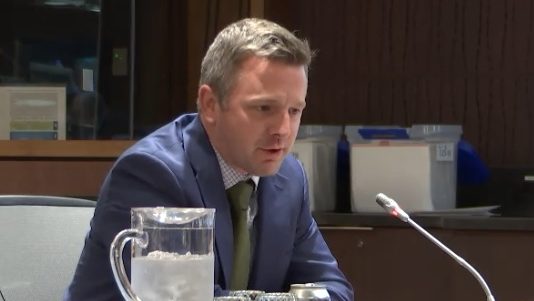Remarks made by Glengarry-Prescott-Russell Member of Parliament (MP) Francis Drouin made the debate more lively at a House of Commons committee meeting in Ottawa on Monday, May 6.
Drouin, a Liberal MP, is a member of the House of Commons Committee on Official Languages. That day, the committee was hearing from two witnesses about funding of English-language postsecondary education institutions in Québec. Independent researcher Frédéric Lacroix and CÉGEP (junior college) Professor Nicolas Bourdon both told the committee that English universities and CÉGEP’s in Québec are eroding French as a language used at home and in the workplace.
“I think it is undeniable that French is declining in Québec,” Lacroix said. He contended there has been a 3.9 per cent decline of the Québec population speaking French at home, along with declines in the workplace.
“Anglophones are receiving four times their demographic weight in funding,” Lacroix said.
“These days, you see non-anglophones and mainly francophones and anglophones going to these (English) CÉGEP’s,” Bourdon said.
“Francophone CÉGEP’s are being anglicized to compete with English CÉGEP’s,” he added.
“You have quite the extremist point of view,” Drouin responded, and asked if they had done research on francophone minority education in other countries.
Lacroix questioned if “extreme” was appropriate parliamentary language.
“If you’re going to play games, I don’t have patience for that,” responded Drouin.
“It’s unacceptable, you’re treating someone as extremist. Would you accept that yourself to be treated as an extremist?” responded Committee Chair, Liberal MP René Arsenault.
“I’m not accusing anyone with anything, I’m just trying to understand the reality,” Drouin said.
He said anglicization is happening in other countries.
“Do you really think there’s a big problem of anglicization in Québec?” Drouin asked the witnesses.
Lacroix said he researched the situation in Québec. He said Statistics Canada data proves English institutions have a very high impact of anglicization on francophones. He then remarked that Drouin probably thinks Statistics Canada is an extremist organization.
“I am franco-ontarien, I have anglo universities everywhere, so I find this discourse insulting. It is lacking the intellectual respect vis-à-vis what is happening internationally,” Drouin said.
“Excuse me, but you’re full of s—. I’ll take it back, but you’re way off base,” Drouin continued.
“I apologize, but I will withdraw, but you’re really not identifying the main issue,” he then said.
“It doesn’t really happen that often at the Committee of Official Languages that it gets this heated,” remarked Godin.
“To tell people they’re full of it, that’s witness bashing,” said Bloc Québecois MP Mario Beaulieu.
Godin asked Drouin to withdraw his comments and he obliged.
“It is very unusual for you to speak on that tone,” Godin said.
“Well, I’m an ardent defender, a francophone ontarien who has defended the language charter in Québec,” Drouin said.
He continued, holding a cell phone as an example, and remarked how today’s youth depend on virtual platforms.
Drouin said the Bloc has never defended minority francophones outside Québec.
Bourdon said he was upset by Drouin’s accusation they were taking an extremist position.


